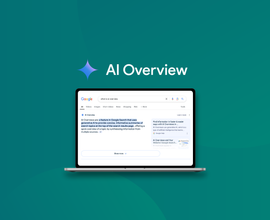The State of SEO in 2025
SEO is undergoing one of the most significant disruptions ever with the launch of AI-powered search experiences. Maintaining market share, optimizing content, agile adaptation, and boosting efficiency to drive faster execution of SEO efforts will be critical to remaining competitive in the 2025 landscape.
Access the latest data on SEO changes, enterprise SEO trends, and more in our 2025 State of SEO Report, based on exclusive data from our annual SEO survey, to inform your SEO strategy for the next 12 to 18 months.
State of SEO: What 2024 was like and predictions for 2025
In the constantly changing digital landscape, SEO continues to be one of the most cost-effective and reliable strategies to increase brand visibility, organic website traffic, and overall business growth.
While the core principles of SEO remain the same, 2024 ushered in the most significant disruption to the search landscape in over a decade: Google’s AIO, the AI-powered search experience formerly known as SGE.
The new search experience was launched to all users in North America in May 2024, with multiple regions following soon after.
This disruption and the widespread adoption of generative AI in 2024 presented both challenges and opportunities for digital experts involved in SEO.
Despite the dynamic nature of SEO, its impact on website performance remains undeniable. On average, organic search produced 33% of overall website traffic across seven key industries in 2024.
91% of respondents reported that SEO positively impacted website performance and marketing goals in 2024, according to our 2025 State of SEO Survey.

With all eyes on the future, organic search continues to be a crucial channel for business growth.
To help you stay ahead of the curve and optimize your SEO strategy for success in 2025, we surveyed over 350 digital marketing, SEO, and Content Marketing.
Content marketingContent Marketing
Content marketing is a marketing discipline with the goal of increasing awareness and scope for products and brands in the desired target group with content published on the web and offline.
Learn more is a marketing discipline with the goal of increasing awareness and scope for products and brands in the desired target group with content published on the web and offline.
Data & methodology
To ensure the accuracy of our data and takeaways, all survey respondents serve a primary job function related to managing a brand’s website or digital presence and dedicate a portion of their overall bandwidth to SEO.
Respondents were sourced from B2B and B2C companies ranging in size from small (1-149 employees) to mid-market (150 to 999 employees) and enterprise (1,000+ employees). Our data represents the perspectives of various digital stakeholders across all role levels, including practitioners (think analysts, strategists, and specialists), managers, directors, and above.
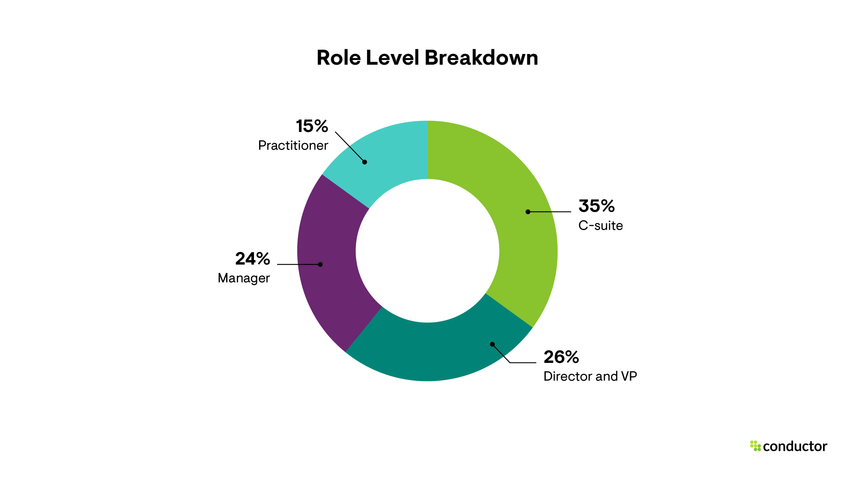
Throughout the report, we used the concept of SEO maturity to further segment the data. Below is a brief overview of the three levels respondents could choose from to determine their SEO maturity:
- Low SEO Maturity: Organizations where SEO is not that important yet. There are currently minimal resources or investments in SEO.
- Medium SEO Maturity: Organizations where SEO is moderately important with adequate SEO resources and investment.
- High SEO Maturity: Organizations where SEO is a priority. SEO is a significant part of the processes for more than one team with strong investment.
Top takeaways
Here’s a brief overview of some of the most important takeaways from the report related to the current state of SEO, the role of AI within SEO, and SEO technology use.
On the current state of SEO
- 91% reported that SEO positively impacted website performance and marketing goals in 2024.
- Organizations at the lowest SEO maturity level are much more likely to report SEO as having no impact or a negative impact.
- Why? On average, Organizations at the highest SEO maturity level:
- Prioritized hiring highly skilled SEO talent rather than outsourcing SEO to an agency or freelancer
- Are 4x more likely to use a fully integrated enterprise SEO platform
- Measure and report on 3x as many SEO metrics compared to organizations with low SEO maturity
- Why? On average, Organizations at the highest SEO maturity level:
- Increasing brand awareness through SEO ranked as a top priority for all role levels in 2024, like we saw in 2023.
On the impact of AIO on traffic, visibility, & rankings
- 63% of respondents reported AIO positively impacted organic traffic, visibility, or rankings since rollout.
- Early signs indicate that Google’s AIO isn't having the doomsday impact that some experts predicted.
- Organizations with high SEO maturity are more than 3x as likely to report AIO had a positive impact on performance compared to those with low SEO maturity.
On SEO technology
- The majority of respondents use a fully integrated enterprise SEO platform to achieve success with their SEO efforts.

Top SEO priorities and challenges in 2024
As mentioned above, increasing brand awareness through SEO remained a top priority for all role levels in 2024.
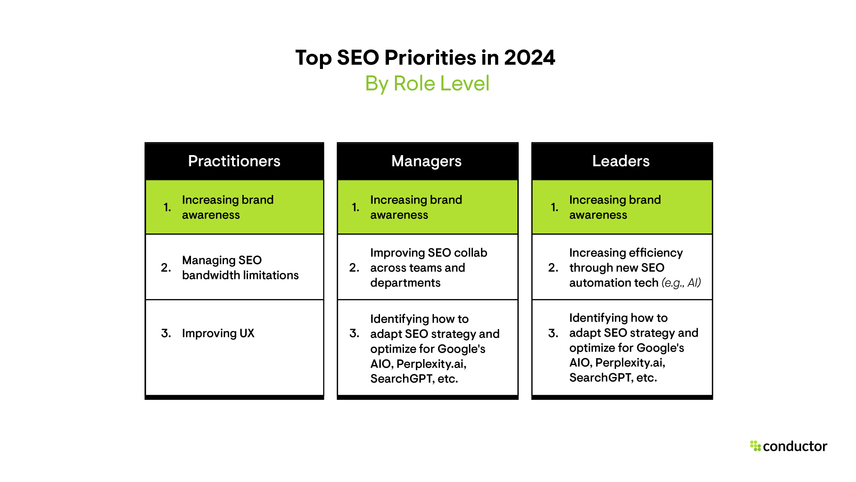
Practitioners and managers are primarily focused on tactical objectives, like improving collaboration and mitigating bandwidth limitations.
- Interestingly, improving SEO collaboration was ranked a top priority by the web dev and analytics job functions exclusively. Likely because they rely on collaboration to take action, unlike SEOs or content marketers.
- Managers could be more aware of this disconnect and are prioritizing improved collaboration as a result.
Leaders are more focused on the latest trends and how to leverage these innovations to fuel growth.
There’s always been this narrative from people who work in SEO that engaging other teams, especially more technical ones like web dev & analytics, is a losing battle. It’s very encouraging that we’re seeing the data show us these are exactly the teams who are willing and actually want to improve collaboration with SEO functions.
If intentions turn to actions in 2025, this could be a year of real progress in the world of website optimization and performance.
When it comes to the most significant challenges, respondents ranked adapting to AI advancements as the top challenge SEOs and digital marketers faced in 2024.
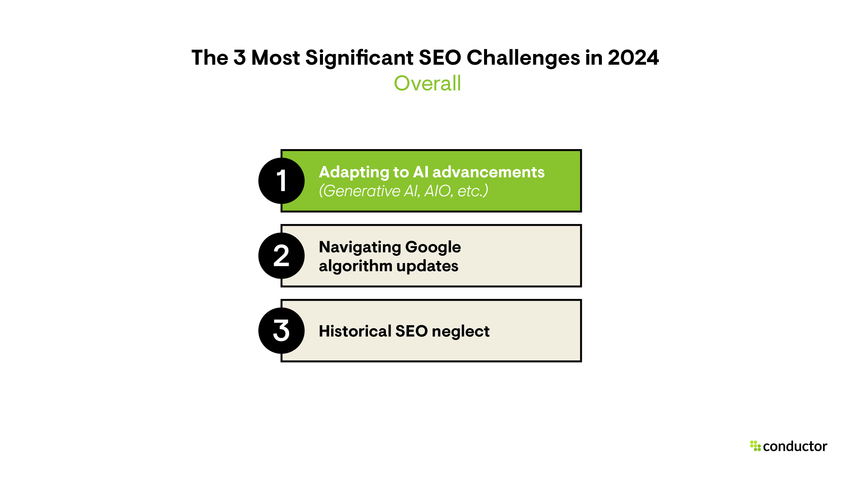
At the start of 2024, all eyes were on Google’s impending rollout of AIO (formerly known as SGE) to all users, so it’s no surprise that adapting to AI advancements was ranked as the most significant SEO challenge overall.
SEOs and marketers braced for the worst in 2024 as major publications predicted the end of search and SEO following the full launch of AIO.
The evolving role of AI in SEO and Google’s AIO impact
Given the uncertainty that preceded and followed Google’s AIO rollout and the emergence of other AI-powered search experiences, AI is a primary focus within the report.
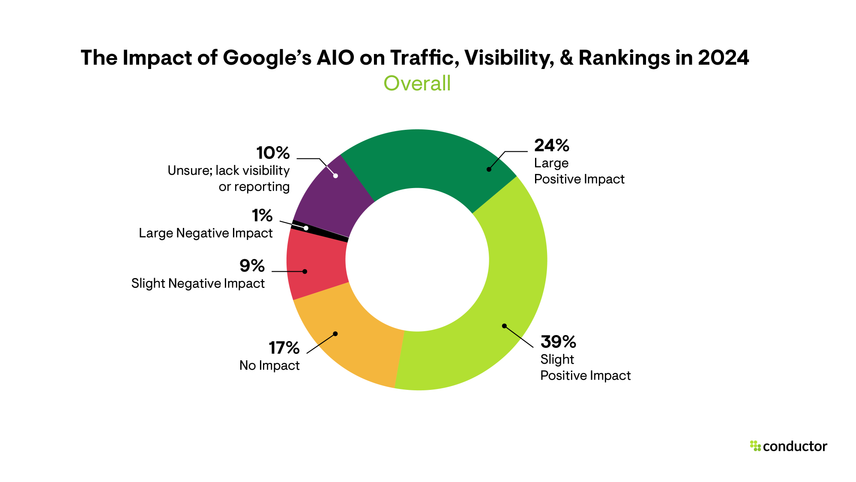
Despite the uncertainty, 63% of respondents reported that AIO positively impacted organic traffic, visibility, or rankings since rollout.
This is an encouraging stat, and I've been saying that folks have to stop thinking that something bad is happening and start thinking that something different is happening.
Not all change is bad, and I believe that AIOs are actually a good experience and will help surface more sites and content and create more opportunity.
Change is always painful at first, but folks have to stand up and ride the wave, or they are going to get swept underneath it.

SEO resourcing and processes
As we enter a new era of search, organizations are prioritizing efforts to improve collaboration and efficiency related to SEO. However, your SEO resourcing strategy greatly impacts the effectiveness of these efforts.
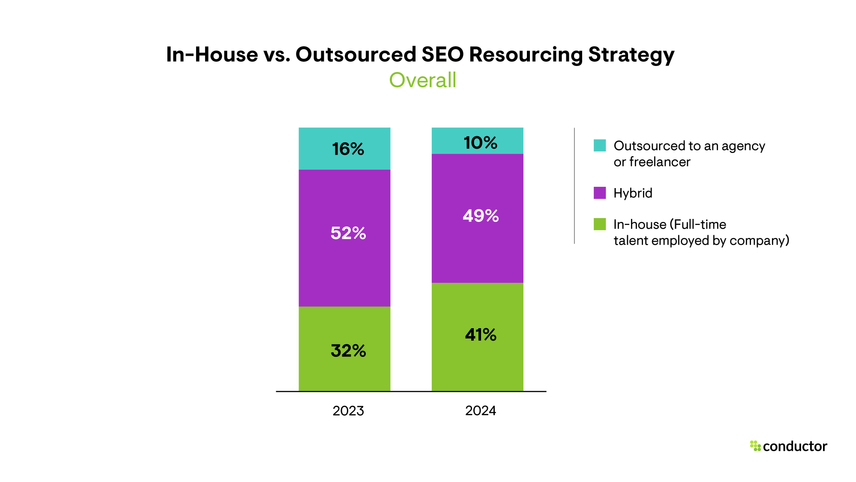
Compared to our previous State of SEO survey results, organizations reporting an in-house strategy increased 9% year-over-year.
Why? Implementing an in-house SEO resourcing strategy allows companies to play a more active role in developing and executing SEO strategies. An in-house SEO strategy could also enable faster adaptation to future AI-related disruptions in search.
How to stay ahead in 2025
Organic search as we know it is changing with Google’s rollout of AIO in 2024, but the future remains bright.
Cross-functional collaboration across all digital teams, comprehensive reporting, essential technology investments, and agile adaptability are the strategic SEO considerations that will separate organizations that succeed from those that don't.
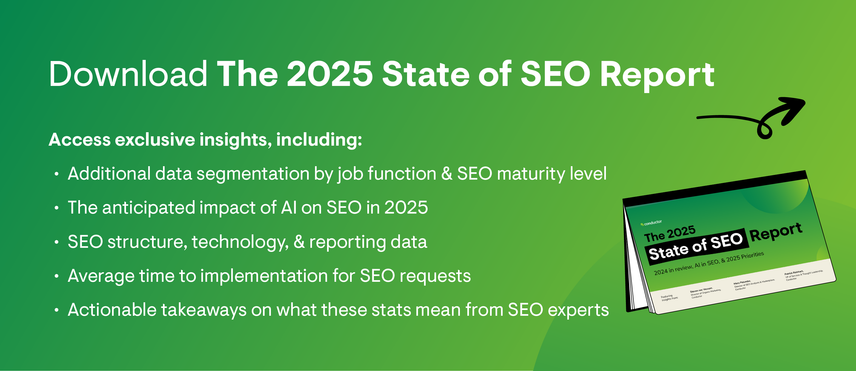
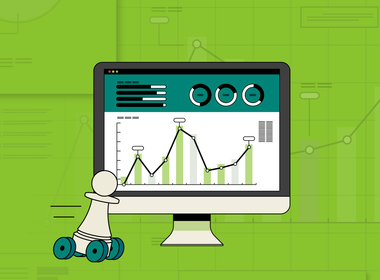
![Spencer Stein, Senior Enterprise Account Manager, [object Object]](https://cdn.sanity.io/images/tkl0o0xu/production/f3274e25800fa6aaac1563d7f2aed61f672a7fa5-3456x5184.jpg?fit=min&w=100&h=100&dpr=1&q=95)
![Patrick Reinhart, VP, Services and Thought Leadership, [object Object]](https://cdn.sanity.io/images/tkl0o0xu/production/9bc72298b24ad01b732de4c3376f79546d20f81c-3542x3542.png?fit=min&w=100&h=100&dpr=1&q=95)


